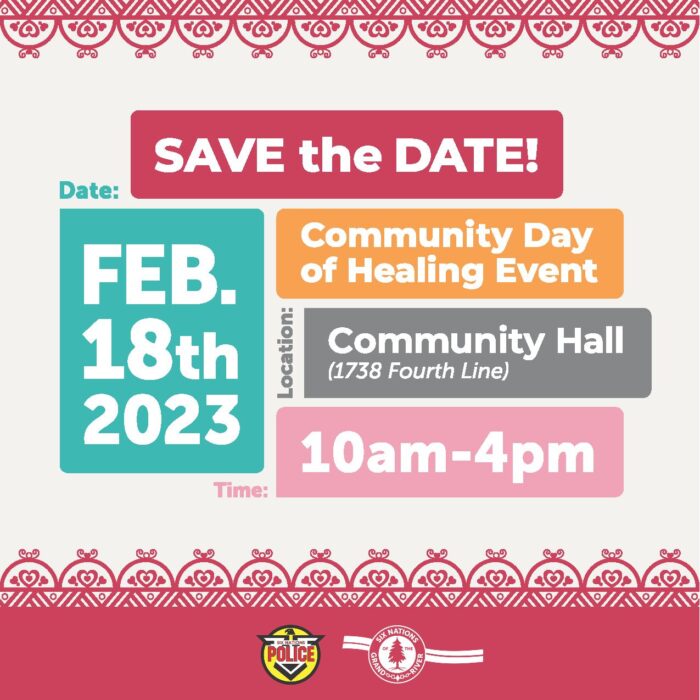
With a new year comes hope for new beginnings and a time to recommit to being, and doing, better.
But 2023 has brought with it tragedies and losses in the short month since the new year started.
Overdoses, suicides, car accidents, losses and shocking crimes that happened too close to home have left a pall over the community.
Add to it that in one month we will be witnessing the third anniversary of the declaration of the Covid pandemic, coupled with skyrocketing inflation and unprecedented poverty, and it’s no wonder people might feel hopeless.
With that, Six Nations of the Grand River Elected Council is organizing a community day of healing on Feb. 18 and although the details have yet to be finalized, a few community leaders are hoping it will make a difference for better days ahead.
“I think it’s a good idea to do something, hoping that people can come together and support each other,” said Coun. Helen Miller. “I think it’s a good idea to get everybody together. Everybody can support each other. We’re losing so many people. It seems like our community is just grieving constantly. Every week there’s two or three people passing. Hopefully, the day will let people forget about their grief a little bit.”
The community has lost quite a few treasured members recently.
Miller, who has served on elected council for about two decades, said she was shocked by the sudden recent passing of former Elected Chief Bill Montour.
“That was quite a shock. That was fast. That was a big shock to our community.”
In addition, Six Nations is dealing with overdoses, suicides, drug addiction and crime, coupled with the fallout of the Covid pandemic and people who are still isolating as they come into contact with potential cases of the virus.
“We’ve got to figure out what we can do about it.”
Coun. Miller said nobody in the community has sat down and had a good conversation about how to cope with the effects of the recent tragedies, the pandemic, skyrocketing inflation and poverty rates.
She believes the pandemic influenced people to stay home instead of working, and they got used to it.
In short, she said, the pandemic affected people’s mental health.
“I think a lot of it is mental health and it all came out because of Covid. It really changed our lives. It changed everybody’s life. Nobody was going anywhere, just hunkered down at home.”
She said she hopes the day of healing helps people get a break from some of their troubles and worries, at least for a day.
Janie Jamieson, a well-known community activist who was one of the driving forces of one of the biggest land rights fights in modern history on Six Nations, has faced her share of loss, as well.
Both her mother and daughter died by suicide, and Jamieson likens the rates of mental health struggles, suicide, drug addiction and crime to generations of unresolved trauma.
“There’s so much trauma, historical trauma, generations of it.”
And she says it concerns her when she sees community social agencies with parking lots full of the newest vehicles while others suffering from trauma seem to continue to struggle, generation after generation.
“They (social workers) should all be working themselves out of a job,” she said, adding more accountability is needed to ensure targets are being hit, that suicide rates and overdose rates and crime rates are going down.
“There’s not a whole lot of healing that’s been happening. When you drive through the community some of the nicest vehicles are parked at these organizations.”
Jamieson said there should be a revamp of social services on Six Nations and services should be reviewed every three or five years to see what’s working and what isn’t.
“I have a million and one ideas about wellness and most of it goes back to the mental health of our people,” she said. “What is going on here? It’s poverty, it’s addictions, all these different dynamics that go back to genocide and historical trauma. A lot of the addictions, trauma, murder, suicide…a lot of that can be contributed to unhealed trauma.”
Jamieson believes the direct descendants of residential schools are facing the most generational trauma, while those whose ancestors did not attend residential schools are thriving.
What’s difficult for people to participate in a community-wide day of healing, she said, is families seeing other families who inflicted trauma on each other and the difficulty in forgiving them, she said.
She said the people who harmed her daughter Jewel, who died at the age of 12 in 2010, have not taken accountability.
There are other families dealing with similar situations, making it hard for everyone to come together, as they used to, she said.
“That’s something that a lot of us struggle with. How do you forgive them? Where do you begin? What does forgiveness look like? How do we ever sit together again as one? In 2006, we did that. I don’t have any solid answers. In the midst of my family’s trauma, we still try to do the best we can and contribute the best we can to our community. People call me for help, I’ll help however I can. There’s so many simple ways for us to help each other.”
There are no easy answers.
“I deal with my daughter’s loss every day. There’s been so much trauma and harm to one another in our community. We can all attend this one day festivity, but at the end of the day, has there been any amends made to one another? Everybody wants a healthier community without a doubt.”
How the community can go about that, she’s still unsure.







